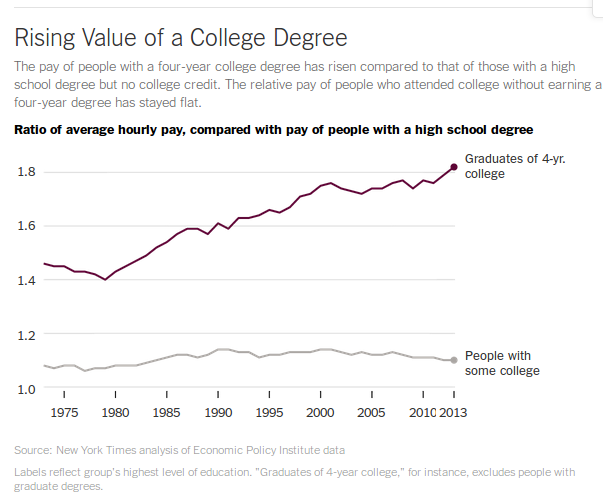May 27, 2014
At the Upshot today, David Leonhardt asks if college is “worth it” and answers with a resounding “clearly,” citing data he obtained from the Economic Policy Institute. Leonhardt’s answer, however, raises a bigger question, which he leaves unexamined: if college is such a good investment, why aren’t more people making it?
The data he presents show a big increase between 1979 and 2013 in the earnings of college graduates relative to high school graduates (the top line in the chart below). The gap, which has always been large, grew steadily for more than 20 years from the end of the 1970s into the early 2000s before slowing down in the 2000s. Leonhardt makes much of the uptick in the last couple of years, which puts the returns to college at an all-time high, but the growth in the college premium has clearly decelerated somewhat since about 2002, even with the finishing flourish in the chart.
The chart, however, also poses a serious puzzle. Leonhardt concludes that: “from almost any individual’s perspective, college is a no-brainer.” If that is true, then, in a well-functioning market, we would expect that this extraordinary increase in the payoff to college would have led to a large increase in the supply of college graduates. In fact, as economists have documented for several decades now, the supply of college graduates decelerated at about the same time that the return to college started to increased. The share of college graduates in the workforce continued to grow after the early 1980s, but at a slower, not a faster, pace than it had in the 1960s and 1970s.
Unless we think that the main reason young people aren’t going to college is because they don’t know that the average return to a college degree is very high (and always has been), then the much more interesting question is why it is that more young people aren’t going to college? Given the size of the returns to college –Leonhardt cites numbers from MIT economist David Autor that suggest that the present discounted value of college is roughly $500,000– the barriers must be substantial.
I’ll offer two quick reasons why college may be, in practice, less of a “no-brainer.”
First, as Heather Boushey and I (and, more recently, MIT economist Frank Levy and colleagues) have argued, not everyone who goes to college receives the average financial return. A non-trivial portion of college graduates earn less than the average otherwise comparable high school graduate. (In the current issue of Science, which the Upshot piece refers to, David Autor makes this same point: “Although the average college graduate earns substantially more than the average high school graduate, the least successful college graduates may earn substantially less than the median among high school graduates, and the most successful high school graduates may earn substantially more than the median among college graduates.”) At least some high school graduates on the fence about college might realistically expect –because of their grades, test scores, health situation, work responsibilities, or family obligations– that they will find themselves with a below-average pay-off to college.
Second, as Heather and I also argued (and as Ben Casselman notes in a post today at 538), the big financial returns to college depends heavily on finishing your degree, but more than 40 percent of those who start college for the first time don’t finish within six years. Those who don’t finish have little to weigh against their lost earnings, lost years of labor-market experience, direct outlays in tuition and fees, as well as any student debt they might have acquired. Again, from the point of view of a young high school graduate considering college, knowing that there is a 40 percent chance that you will start, but won’t finish is pretty discouraging –again, especially if you have reasons to believe that you might more be more likely to be in the 40 percent than in the 60 percent. (Autor also makes this point in Science: “for students who acquire substantial student debt but do not complete the college degree, it is far from certain that college will prove a good investment.”).
That I can identify, Leonhardt mentions only one reason that we don’t have more college graduates and does so only in passing. He quotes Autor as saying “we have too few people who are prepared for college.” But, if this is the main barrier to increasing the share of workers with a college degree, then we are in more trouble than Leonhardt seems to think. If we have not prepared enough young people to do college work, then we can hardly expect that these unprepared young people will finish college even if they start or that they will receive the high average returns earned by current graduates.
I may be wrong about why young people aren’t going to college in bigger numbers, and almost certainly there are other factors at play, but knowing why the young aren’t going to college in much greater numbers is a far more important question than knowing whether college is “worth it” “on average” and “all-else equal” for the people who have already gone.







